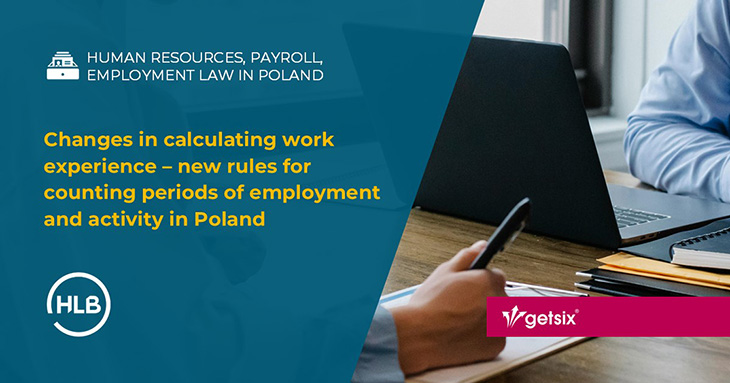Changes in calculating work experience – new rules for counting periods of employment and activity in Poland
From 2026, the definition of the period of employment will be significantly broadened. On 15 October 2025, the President of Poland, Karol Nawrocki, signed an amendment to the Labour Code which will make it possible to include not only traditional employment contracts, but also other forms of professional activity – such as running a business or performing commission-based work – in the period of employment.
The new regulations aim to ensure equal opportunities for employees and entrepreneurs in accessing benefits and entitlements resulting from the length of employment.
In this article:
What will count towards the period of employment under the new regulations
Under the amendment, the period of employment will include not only time worked under an employment contract, but also the following types of activity:
- running a non-agricultural business,
- cooperating with a person who runs a business,
- periods of suspension of business activity for the purpose of providing personal childcare,
- work performed under contracts of mandate, service contracts, or agency agreements,
- membership in agricultural production cooperatives and agricultural machinery cooperatives,
- documented periods of gainful activity abroad, other than standard employment,
- service in the Marshal’s Guard and in the Customs and Fiscal Service.
These changes mean that many people running their own businesses or working under civil law contracts will gain the right to higher seniority-based allowances and longer annual leave entitlements.
Documenting the period of employment – the role of ZUS and employee obligations
Confirmation of newly recognized periods of employment will be based on certificates issued by the Social Insurance Institution (ZUS).
If ZUS is unable to issue such a certificate (for example, due to the passage of time), employees will be allowed to document their employment periods using other evidence – such as contracts, invoices, or proof of cooperation.
It is also important to note that periods prior to the entry into force of the new law will be included. Employees will have 24 months to submit documents confirming those periods.
When the new regulations on employment periods will take effect
The amendment to the Labour Code will enter into force in two stages:
- for the public sector – on 1 January 2026,
- for the private sector – on the first day of the month following six months after the publication of the Act.
This means that as early as next year, thousands of employees and entrepreneurs will be able to apply for a recalculation of their employment periods and the benefits arising from them.
Why the changes to employment periods are important
According to the Chancellery of the President of the Republic of Poland, the amendment aims to “eliminate inequalities in the treatment of employees based on the type of previous professional activity undertaken.”
The Ministry of Family, Labour and Social Policy has emphasized that this marks “the end of dividing honestly performed work into that which is more or less worthy of recognition.”
In practice, this means that the period of employment will become a fairer measure of professional experience, regardless of the form of work performed. As a result, many people will gain the right to seniority-based bonuses, jubilee awards, and longer annual leave.
The new regulations on employment periods represent an important step toward equal treatment of all workers. Including periods of self-employment, civil law contracts, and work performed abroad will bring tangible benefits to thousands of people.
It is advisable to start preparing the necessary documents now and to follow ZUS announcements to ensure that your professional experience is properly documented once the new rules take effect.
Legal basis: Act of 26 September 2025 amending the Labour Code and certain other acts.
If you have any questions regarding this topic or if you are in need for any additional information – please do not hesitate to contact us:
HR & PAYROLL DEPARTMENT

BARBARA
ROZWADOWSKA
Head of HR & Payroll Department
Department / Senior Manager
getsix® Group
***














